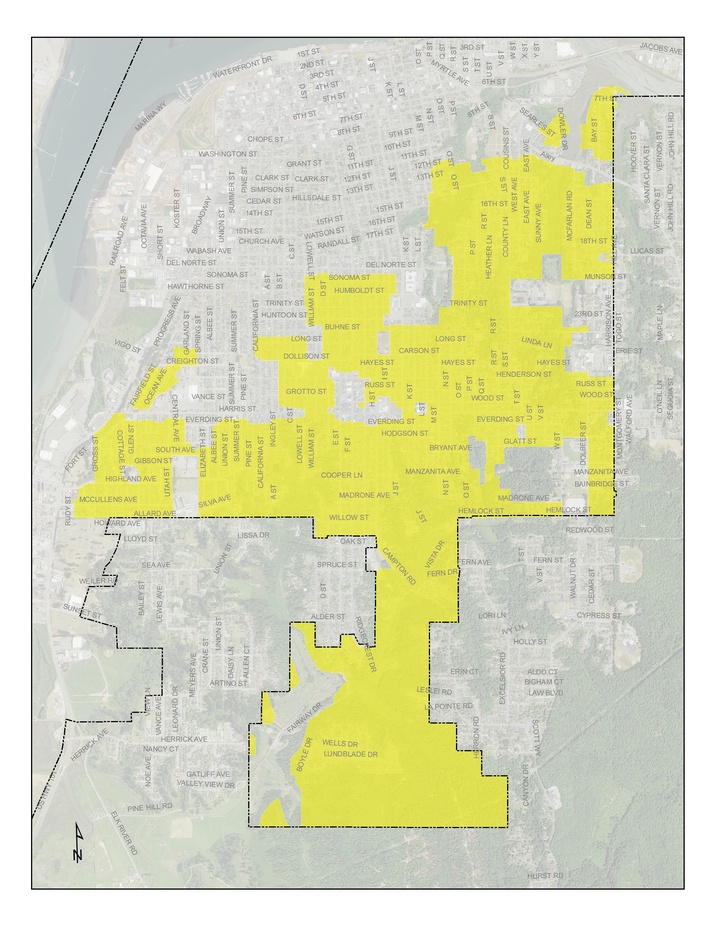Yes, it’s a new month, which means it’s time for another episode of the Outpost‘s favorite municipal policy serial, “Get to Know a Zone District.” Enjoy!
Welcome to the third installment of our fourteen-part series “Get to Know a Zone District.” In this series, a staff-member in the Planner Division answers questions about each Zoning District in the City. This month we will be exploring our largest and most commonly discussed Zone District – RS-6000. Statistically, this is probably where your house is.
1. What is RS-6000? What does it stand for?
Great question. The “RS” stands for “Residential Single-Family”. The 6000 refers to the minimum lot size, which is 6,000 square feet. This means that City regulations will not allow any lots in this zone to be less than 6,000 square feet in total area.
2. Whoa Buddy. There are a bunch of lots in this town which aren’t 6,000 square feet. What happens if I have a little lot – like 4,000 square feet?
In almost all cases, you’re fine. Eureka is an old town so lot size varies. People also used to split lots willy-nilly, which is something that you just can’t do anymore.
3. So this is the zone for single family homes?
Exactly. This is a zone that was created for single family homes and complementary uses such as garages, churches, and schools. In that way, it may also be termed our most restrictive zone. It’s really for single family homes and not much else.
4. What about commercial uses, like medical offices and dental offices? Could those go in this zone?
Nope. There might be some that have been operating for 50+ years which are “grandfathered” (what we call “legal non-conforming”), but overall the answer is no.
5. What about home-based businesses? I knit baby hats and sell them online. Could I do that from my house in the RS-6000 zone?
Most likely, yes. There are certain home-based business types that are allowed in this zone. A person must get what is known as a “Home Occupation Permit” from the Development Services Department first, however. Not all businesses qualify; they must be low-key businesses that won’t disrupt the neighborhood. If the business creates addition noise, traffic, etc. it probably would not be allowed.
6. What about duplexes and apartment buildings? Are they allowed in this Zone?
Nope. Those uses are reserved for other, higher-density residential and commercial zones. RM-2500 and RM-1000 are great zones for those.
7. What about Mother-in-law units? Are they allowed in this Zone?
Yes, with some limitations. Mother-in-law units, or Accessory Dwelling Units (ADUs) as we call them, are permitted. The most a property owner would be able to have on their lot in this zone would be a single-family home with a mother-in-law unit (assuming there was enough space on the lot to meet the City’s requirements).
8. I really dig Mother-in-Law units. I mean, if I could have a renter in my backyard dropping $800 per month into my pocket it would really go a long way towards my own mortgage! Thing is: I don’t really have a big back yard…is there any other way to create one?
For sure. Mother-in-Law units (Accessory Dwelling Units) can be created in a few different ways. Most folks think that you need to build a little stand-alone structure, but this isn’t the case at all. You can also carve out a portion of an existing house to create the ADU, you can build an attached addition, or you can build one over an attached garage.
9. Wow. That is really wild. I’m so stoked on ADUs that I would really love to read up on the topic. Wasn’t there some recent legislation dealing with these?
You bet. The State legislature has passed bills (or amendments) in 1981, 1986, 1990, 1994, 2002, and 2016. You might say it’s a legislative tradition at this point. The most recent version (effective January 1, 2017) is contained in Government Code §65852.1 – 65852.22
10. Sick.
You’re welcome?
11. Wait. A Mother-in-Law suite sounds a lot like a second unit. You said a minute ago that you can’t have duplexes in the RS-6000 zone. What’s the deal with that?
ADUs are a whole ‘nuther thing. Trust me. It’s not the same as turning your house into a duplex. In a multi-family zone (for example RM-2500 or RM-1000) it may be possible to add a 2nd, 3rd, or 4th unit, but that is an entirely different process from adding an ADU.
12. Interesting. How can I find out if I can add an ADU to my property? Is there anything else I need to know?
There are some particulars. If you’re curious, please contact the Development Services Department (441-4160) to discuss your situation.
13. What are the setbacks for a detached garage?
Five feet from the rear, and five feet from the sides (assuming you have a 20’ wide alley behind your property) for a detached garage.
14. Great! That’s easy enough to remember. What about fences?
If the fence is under 6’ tall you don’t need a building permit, or any other kind of permit from the City. Just please make sure that you don’t build it in the road right-of-way or on your neighbor’s property.
15. What else can you tell me about this district?
At nearly 1,300 acres, the RS-6000 zone is the largest zone in the City. It also currently includes just under 8,000 residential structures and is home to the majority of Eureka’s population. Single-family residential neighborhoods are America’s number one selling neighborhood type. People just love these.
16. Where can I get more information about other zoning stuff?
The Development Services Department (and Planning Division) is open Monday-Friday 8am to 5pm (closed from noon-1:00) at City Hall. Stop by or call 441-4160 to speak with a planner.

CLICK TO MANAGE